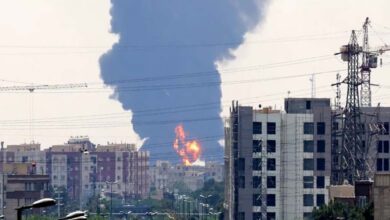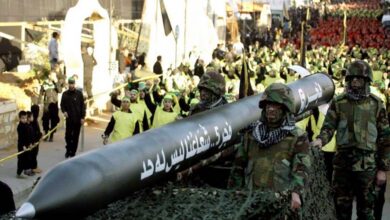Iraq: Will Al-Kadhimi and Al-Halbousi stop the alliance of Iran’s plans to spread chaos?

According to political analysts, the worsening of crises in Iraq depends on the easing of tensions between the Sadrist movement and the coordinating framework forces, which are supported by Iran.
They confirmed that the calm could pave the way for new settlement initiatives by the Iraqi political actors, and these matters might appear outside the bickering Shiite duo with the start of the new national dialog session, which was called for by Prime Minister Mustafa Al-Kadhimi yesterday, Monday. They confirmed that it is possible that there will be a major role that could be played by the Speaker of the Council of Representatives, Mohamed Al-Halbousi, if his alliance with Al-Kadhimi, which is the only alliance capable of confronting Iranian threats in Iraq, succeeds.
Countering Iranian threats
Analysts expect that Al-Halbousi and Al-Kadhimi will seek to indirectly narrow the differences between the Sadrist movement and the coordination framework in order to confront any Iranian threats in Iraq by igniting chaos. The newspaper continued that it is not excluded that an agreement could be reached to meet the main demand of the Sadrist movement to hold early elections, especially since Al-Halbousi supported this demand now, calling Sunday for setting a date for such a vote. Al-Halbousi clarified in a statement an agenda of 10 items to be agreed upon during the upcoming dialog sessions.
“The agenda for the upcoming national dialog sessions must include a number of issues on which the political process cannot proceed without agreement,” he said, noting that early parliamentary and local council elections are scheduled to be held no later than the end of next year. He also called for “electing the president of the republic and choosing a government with full powers.”
Sadrist movement decline
For their part, Iraqi analysts described Al-Halbousi’s initiative as close to the coordination framework, which calls for the convening of the Council of Representatives, the appointment of a new prime minister, and the formation of a government to manage the transition period until the elections are held.
However, the Sadrist movement demands the dissolution of the parliament first, and keeping the current caretaker government in power until the next elections. Analysts do not exclude the possibility of the Sadrist movement retreating from its call to dissolve the parliament, especially that it is now challenging the legitimacy of the Council of Representatives’ acceptance of the resignation of its members, in an attempt to turn the clock back and return the members of the Sadrist movement to their seats. On Sunday, the Sadrist movement filed a lawsuit before the Federal Supreme Court to rescite the resignation of the Council of the 73 deputies, who formed the largest bloc in the parliament (out of 329 seats)
The call came a day before the start of the new national dialog session called by Al-Kadhimi, after different parties rejected the attempts of the coordinating framework to form the government even before progress was made in reconciliation and securing the truce. Al-Kadhimi called last Saturday for the heads of the political blocs to a second round of the “national dialog” on Monday, and the Sadrist movement boycotted the meeting.












